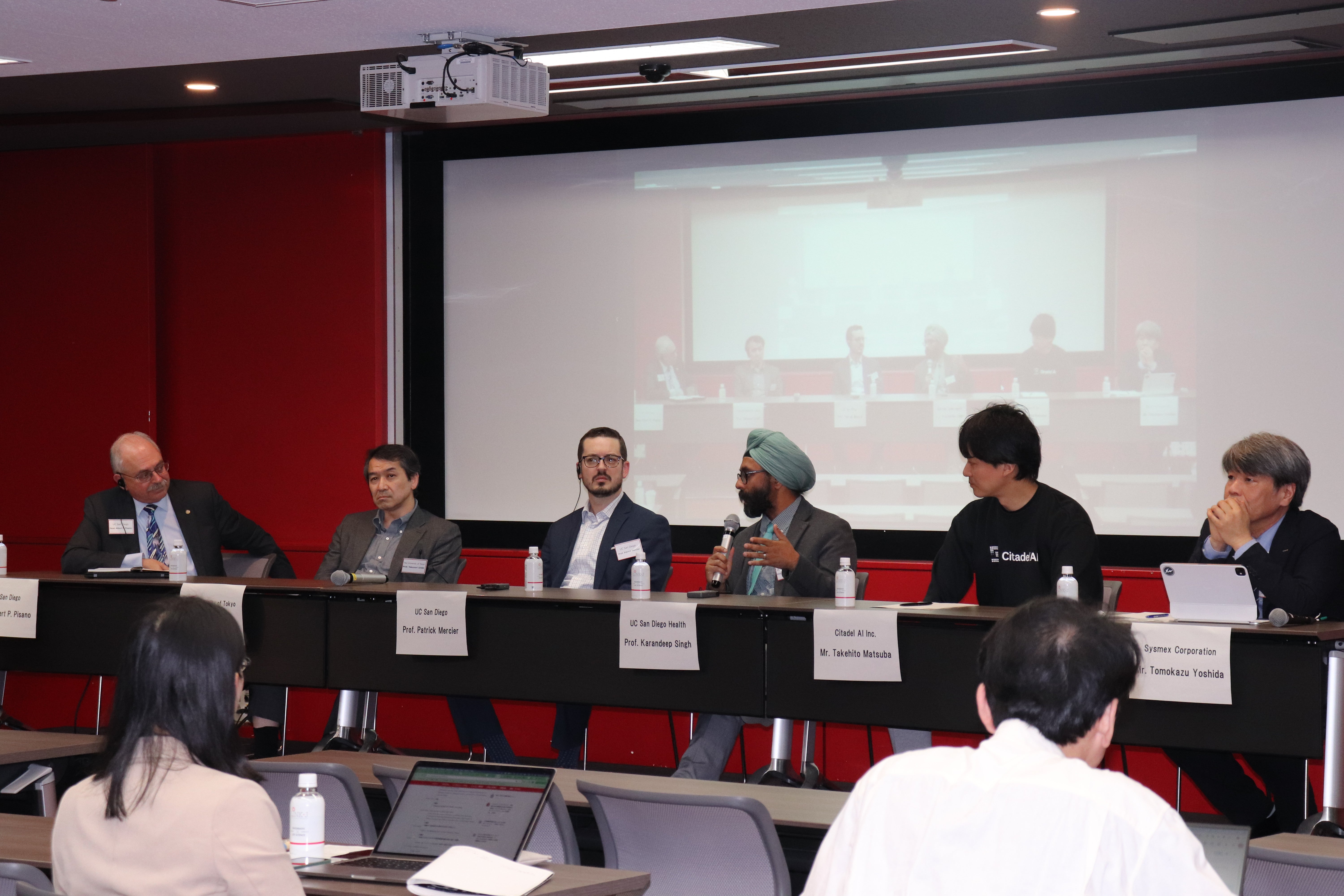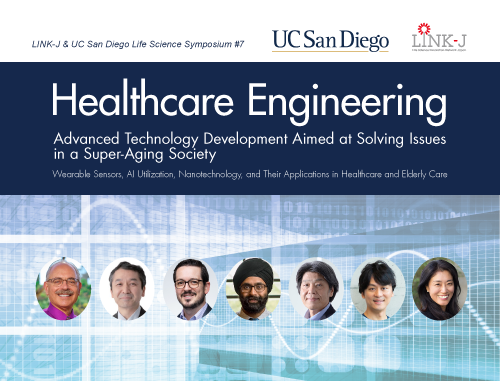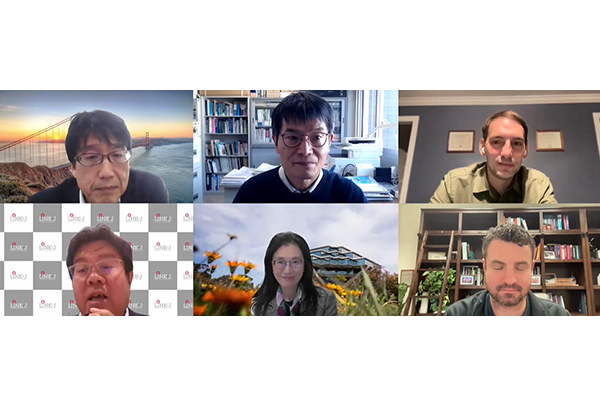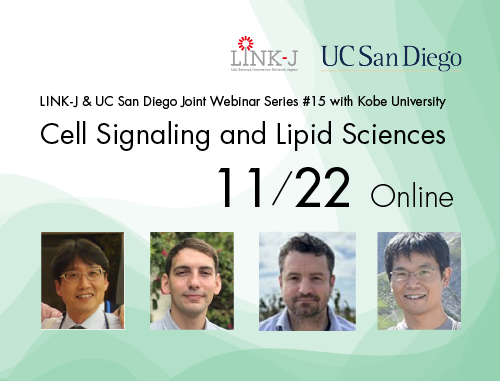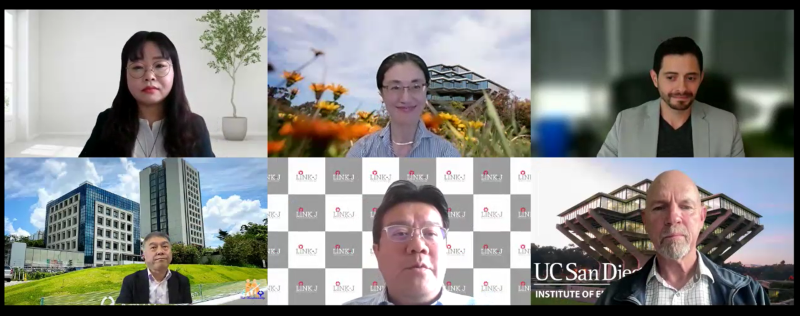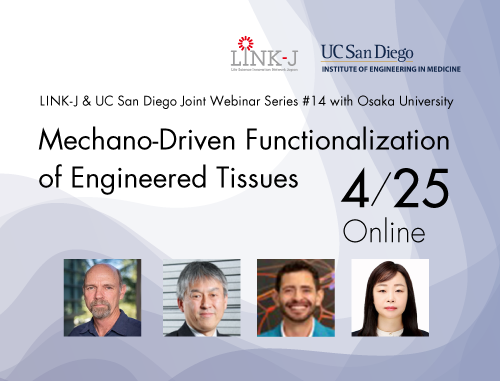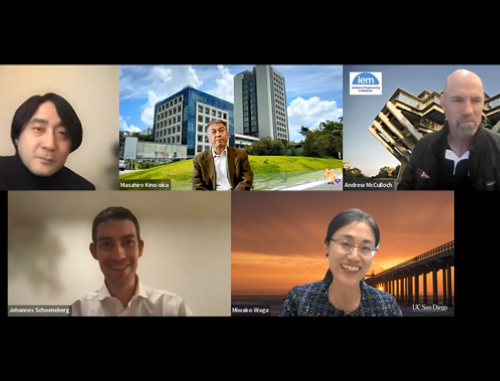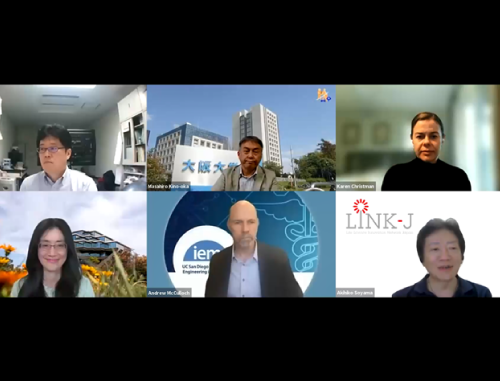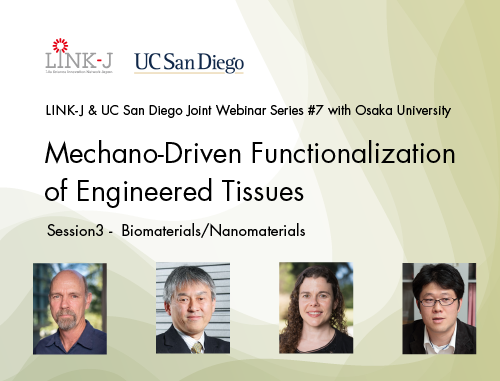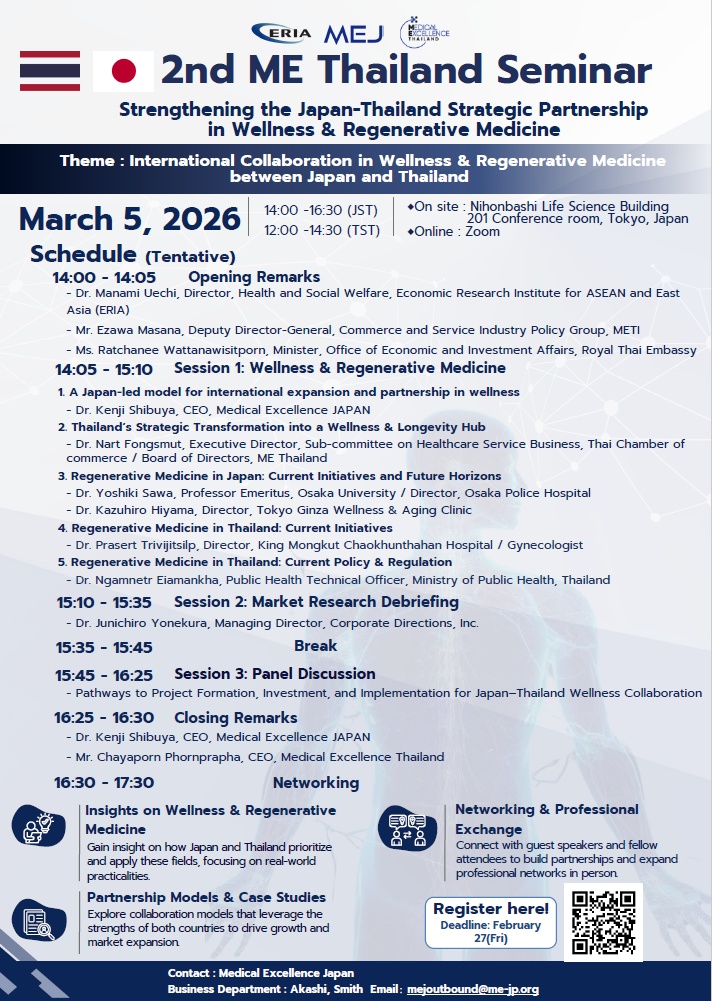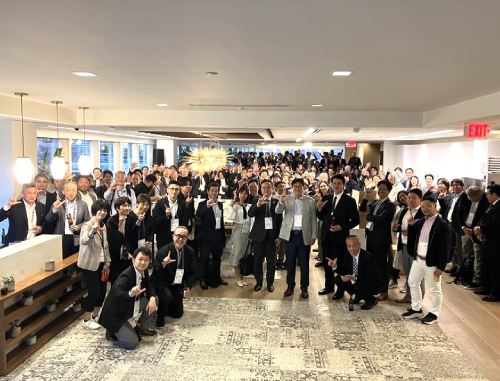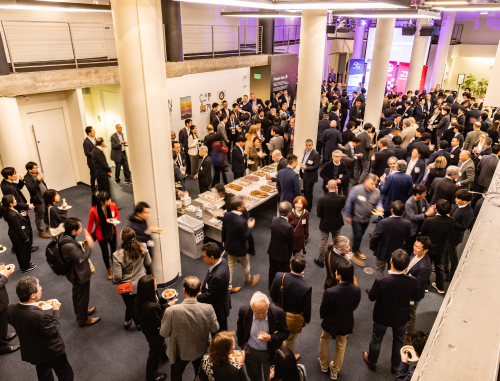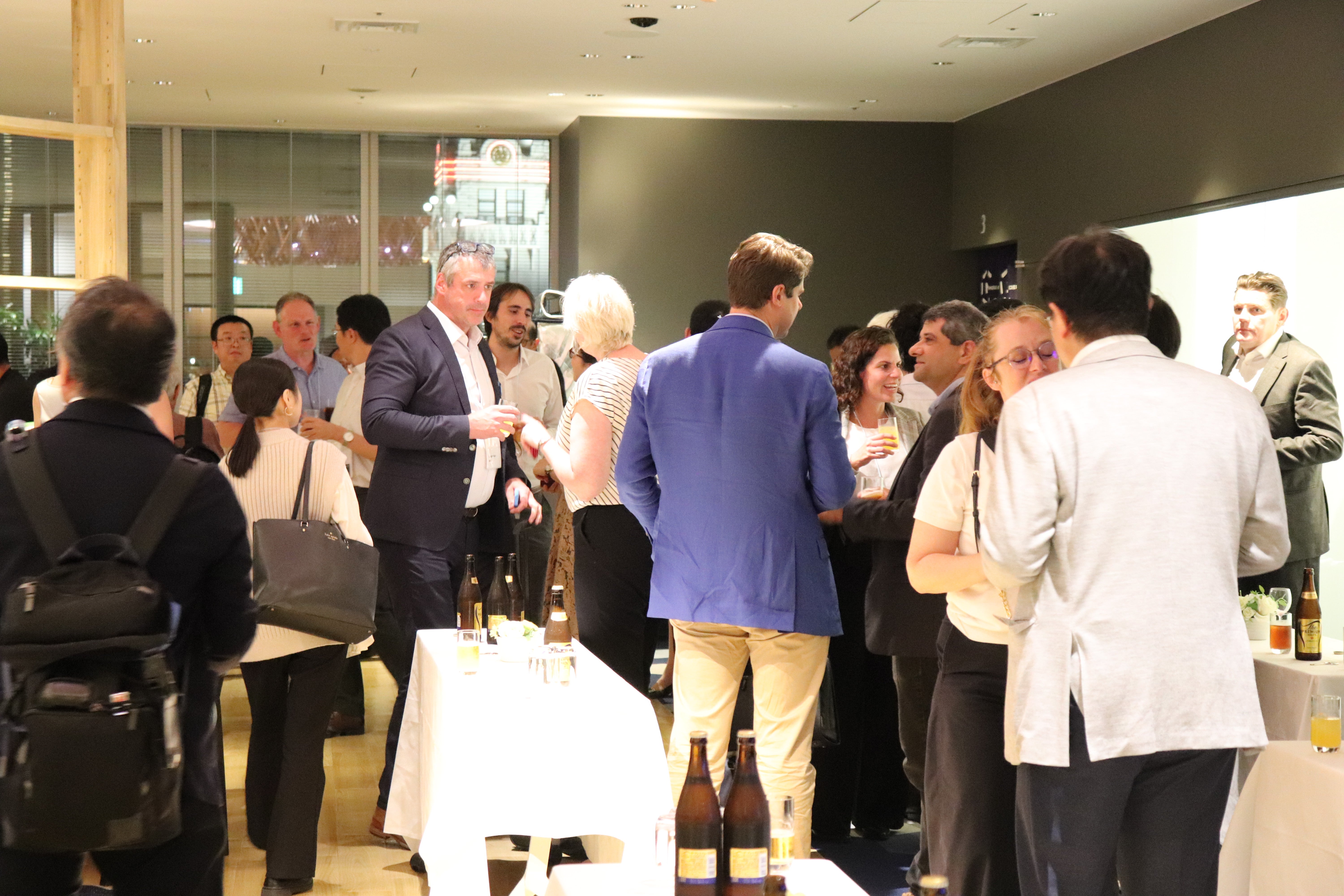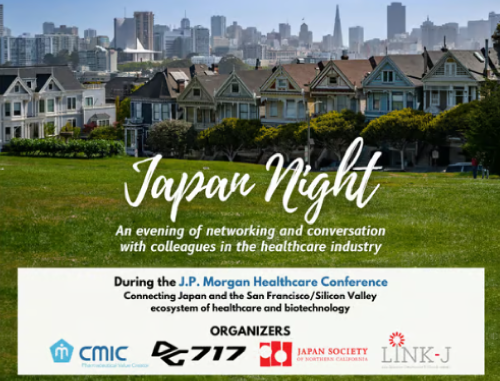UC San Diego and Osaka University have a long history of collaborations in education and research. In recent years, we have strived to expand our areas of collaboration to include bioengineering, bioinformatics, tissue engineering, and regenerative medicine. LINK-J and UC San Diego are pleased to offer a joint webinar, in cooperation with the Osaka University Global Center for Medical Engineering and Informatics (MEI Center), at which investigators from both institutions will present recent work in “Biophotonics.”
*Language:English (English-Japanese simultaneous interpretation available)
*English captions are available (you can choose to turn them on or off).
*Please note that LINK-J and UC San Diego are not responsible for any errors or omissions in the captions.
How to use captions: Managing and viewing closed captioning
To read about past UC San Diego-related events and reports, please click here.
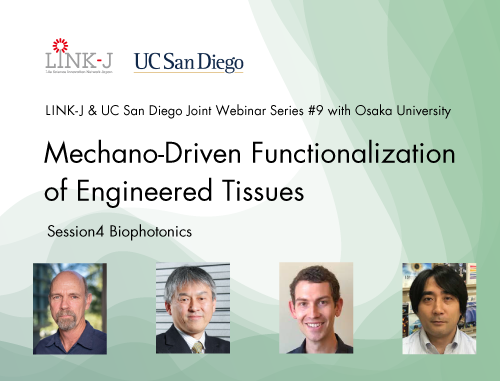
Date: Fri, Dec 3, 2021 10:00am-11:15am [JST] /Dec 2 [PST]
Online (Zoom Webinar)
(Opens an external site)
Registration Fee
Free
Click ”Registration” to open an external site, and click “GET TICKET” on the right bar to sign up for the webinar.
How to participate
This event will be broadcasted on Zoom webinar. Please make a registration through Peatix.
You can join the webinar from "Watch" in the Peatix page on the webinar day.
Program
| Japan time | Pacific time | Agenda |
| 10:00-10:05 | 5:00-5:05 | Welcome - Akihiko Soyama, LINK-J and Miwako Waga, UC San Diego Remarks - Dr. Masahiro Kino-oka, MEI Center, Osaka University & Dr. Andrew McCulloch, UC San Diego |
| 10:05-10:35 | 5:05-5:35 | Presentation - "4D Cell Biology: Adaptive optics lattice light-sheet imaging and AI powered big data processing of live stem cell-derived organoids." Dr. Johannes Schoeneberg, UC San Diego School of Medicine |
| 10:35-11:00 | 5:35-6:00 | Presentation - "Raman microscopy as a complementary tool for biological imaging" Dr. Katsumasa Fujita, Department of Applied Physics, Osaka University |
| 11:00-11:14 | 6:00-6:14 | Q&A and Discussion - moderated by Drs. Kino-oka and McCulloch |
| 11:14-11:15 | 6:14-6:15 | Closing Remarks - A. Soyama |
Abstract
Dr. Schoeneberg's talk
New advanced microscopy methods such as adaptive optics lattice light-sheet microscopy allow fundamentally new insights into cell biology. At the same time, they require high performance computing and machine learning for data processing. The combination allows for four dimensional (4D) cell biology.
Dr. Fujita's talk
Raman spectroscopy has been an important tool for scientists because of its ability to analyze materials in a label-free manner. Raman spectra reflect the vibrations of molecules in a sample and provide rich information about the composition and environment of the sample.
However, due to the low efficiency of Raman scattering, it has been difficult to use Raman scattering for imaging biological samples under physiological conditions. We have developed a Raman imaging technique that achieves fast Raman imaging by detecting Raman spectra of the sample in parallel. By detecting hundreds of Raman spectra from the illumination line in parallel, we were able to drastically reduce the image acquisition time. We applied this line-illumination Raman imaging technique to label-free observation of molecular dynamics in cellular phenomena such as apoptosis, drug response, cell division, and cell differentiation. 532nm laser excitation is used to monitor mitochondrial dysfunction at the cellular level using the resonance Raman effect of heme proteins. We have also proposed and demonstrated the use of alkynes as tiny tags for imaging small molecules. This enabled us to observe molecules that are too small to be labeled by fluorescent probes.
Biography
 Dr. Andrew McCulloch, Distinguished Professor of Bioengineering and Medicine; Director, Institute of Engineering in Medicine, UC San Diego
Dr. Andrew McCulloch, Distinguished Professor of Bioengineering and Medicine; Director, Institute of Engineering in Medicine, UC San Diego
Dr. Andrew McCulloch is Distinguished Professor of Bioengineering and Medicine at the University of California San Diego and Director of the Institute for Engineering in Medicine. He earned his bachelor (1981) and Ph.D. (1986) degrees in Engineering Science at the University of Auckland and joined the UC San Diego faculty in 1987. He directs the UCSD Interfaces Graduate Training Program and the Interdisciplinary Ph.D. Specialization in Multi-Scale Biology. Dr. McCulloch served as Vice Chair of the Bioengineering Department from 2002 to 2005 and Chair from 2005 to 2008. He is also a member of Qualcomm Institute, the Center for Research on Biological Systems, and a Senior Fellow of the San Diego Supercomputer Center.
 Dr. Masahiro Kino-oka, Professor, Department of Biotechnology, Graduate School of Engineering, Osaka University
Dr. Masahiro Kino-oka, Professor, Department of Biotechnology, Graduate School of Engineering, Osaka University
[Professional Experience]
1991.06 - 2000.01: Osaka Univeristy, Research Associate
2000.02.01 - 2003.03.31: Department of Materials Engineering Science, Graduate School of Engineering Science, Associate Professor
2003.04.01 - 2007.03.31: Department of Materials Engineering Science, Graduate School of Engineering Science, Associate Professor
2007.04.01 - 2009.03.31: Department of Materials Engineering Science, Graduate School of Engineering Science, Associate Professor
2009.04.01 - 2020.03.31: Division of Science and Biotechnology, Graduate School of Engineering, Professor
2020.04.01 - present: Department of Biotechnology, Graduate School of Engineering, Professor
[Education]
1989.03 Osaka University Faculty of Engineering Science Graduated
1991.03 Osaka University Graduate School, Division of Engineering Science Completed
1996.01 Ph.D., Osaka University Graduate School, Division of Engineering Science
[Research topics]
Tissue culture, Bioreactor design, Process design, Image analysis, Regenerative medicine, Drug screening system, Biofunction and bioprocess engineering-related, Biomedical engineering-related
 Dr. Johannes Schoeneberg, Assistant Professor, UC San Diego School of Medicine
Dr. Johannes Schoeneberg, Assistant Professor, UC San Diego School of Medicine
[Professional Experience]
2017-present: Postdoc, University of California, Berkeley
2018-2019: Scientific Consultant, Allen Institute for Cell Science
2015-2017: Postdoc, University of California, Berkeley; Max Planck Institute of Biophysics
2013-2014: Subgroup Lead Scientist, Free University Berlin
2009-2014: Subgroup Lead Scientist,Max Planck Institute for Molecular Genetics
2006-2014: Entrepreneur, Schoeneberg Web Services
[Education]
2009-2014: Ph.D., Free University Berlin; Max Planck Institute for Molecular Genetics
2008-2009: M.Sc., Free University Berlin; Max Planck Institute for Molecular Genetics
2005-2008: B.Sc., Saarland University
 Dr. Katsumasa Fujita, Professor, Department of Applied Physics, Osaka University
Dr. Katsumasa Fujita, Professor, Department of Applied Physics, Osaka University
1995.3: Graduated, School of Engineering, Osaka University
1998.4: Research Fellowship for Young Scientists(DC2), Japan Society for the Promotion of Science
2000.3: Ph.D., Graduate School of Engineering, Osaka University
2000.4: Research Fellowship for Young Scientists(PD at Kyoto Prefectural University of Medicine), Japan Society for the Promotion of Science
2002.4-2002.10: Specially Appointed Lecturer, Handai Frontier Research Center
2002.10-2007.3: Assistant, Graduate School of Engineering, Osaka University
2007.4-2007.8: Assistant Professor, Graduate School of Engineering, Osaka University
2007.8-2018.10: Associate Professor, Graduate School of Engineering, Osaka University
2008.10-2014.3: Group Leader, JST ERATO SODEOKA Project
2018.10-present: Professor, Graduate School of Engineering, Osaka University
2019.11-present: Joint-appointed Fellow, National Institute of Advanced Industrial Science and Technology (AIST)
Participation Fee
無料(要事前登録)
Organizer
Host:LINK-J, Co-Host:UC San Diego
Contact
Email:contact@link-j.org
